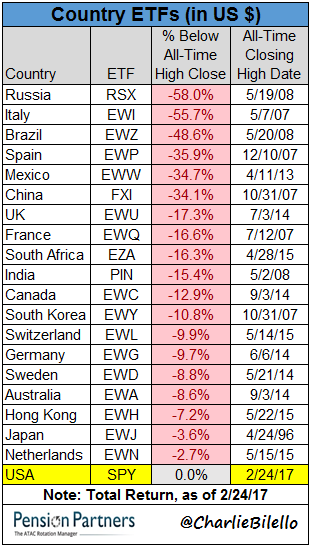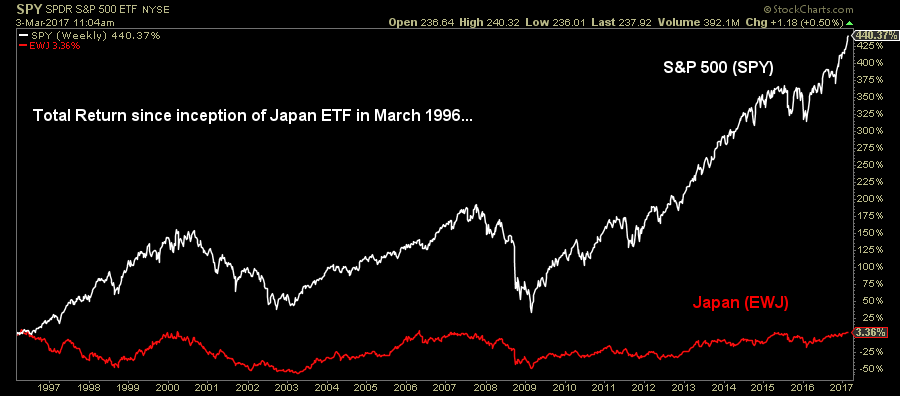When Home Bias Helps
Home bias (favoring your home country in making asset allocation decisions) is pervasive. This is true in spite of the mountain of evidence that suggests it’s sub-optimal: international diversification has been shown to reduce risk in a portfolio over the long run without hurting return.
Why do investors make “sub-optimal” decisions? Because they are human beings, not machines. Favoring one’s home country in making asset allocation decisions feels good, and feelings are the most important driver of investor decisions. We are also told by many to “invest in what you know,” and what we know best are assets in our home country.
If you are a U.S. investor and have more than 53.5% of your equity allocation U.S. stocks (the latest weighting in Vanguard’s Total World Stock Index), you are practicing some form of home bias. You are also, as I wrote last year, not a purely passive investor – you are making an active decision to deviate from the global market portfolio. That may or may not be a good decision, but it is an active decision nonetheless.
Most investors, regardless of their country and whether they know it or not, are practicing home bias in one form or another (if not in stocks then in bonds/REITs/etc.). Perhaps the most extreme example is Australians, who have a 66.5% weighting to their home country stocks while Australian equities make up only 2% of the global equity market.

Source: Vanguard
While academic studies focus on the long, long run (showing the benefits of international diversification), most investors live in the world of the short run, which is their own personal experience. In such a world, there will be many times where engaging in home bias actually helps you, as the home country outperforms. This serves to reinforce the idea that excluding international assets is the right decision.
U.S. investors today are living in such a time.
International diversification over the past five years has led to lower returns with higher volatility and drawdowns. Over the past five years, the S&P 500 (SPY) has gained over 91%, while the MSCI World ex-US (ACWX) has gained only 17% and the MSCI Emerging Markets (EEM) has lost 6%.

Looking out longer-term, over the last 10 years, the FTSE Europe ETF (VGK) is up 4% while the S&P 500 (SPY) has more than doubled.

While the U.S. stock market is hitting all-time highs on a daily basis, no other major stock market ETF around the world (as measured in US dollars) has hit a new high since May 2015. For Russia (RSX) and Brazil (EWZ), you have to go back to 2008. For Italy (EWI), Spain (EWP) and China (FXI): 2007. For the UK (EWU) and Germany (EWG): 2014. For Japan (EWJ): 1996.

That last example is not a typo. Since the MSCI Japan ETF (EWJ) launched in 1996, it has gained a total of 3% versus a 440% gain for the S&P 500 (SPY).

When Home Bias Helps
Any way you look at it, home bias has helped U.S. investors in recent years. When home bias helps, it is extremely difficult to maintain or consider adding to international equities. As I wrote last year (see here and here), though, the best time to diversify into an asset class is after a long period of underperformance. Why? Because it is after such periods that assets are more likely to be cheaper and unloved, and buying cheaper assets tends to lead to better long-term outcomes.
The problem: investors are wired to do the exact opposite, only considering foreign equities after they have outperformed for a long period of time. In chasing past performance, though, they may be eliminating much of the diversification benefits.
Which begs the question: should everyone diversify internationally? The research certainly says yes, but the research assumes rational behavior on the part of investors. It assumes investors will stick with international stocks through thick and thin with the same fortitude as domestic stocks. But this may be an incorrect assumption because most people feel more comfortable investing in only U.S. assets.
This includes the founder of Vanguard, John Bogle, who holds a 60/40 portfolio of only U.S. stocks and bonds:
“I wouldn’t invest outside the U.S. I like the U.S. The U.S. is the most productive country in the world. It is the most rapidly growing of the industrialized nations, other than Switzerland. We still have plenty of problems, but we’re much better than France, Britain and Germany. And we don’t even want to talk about Italy and Greece. And importantly — people forget this too quickly — we have the most established government and legal institutions.” – John Bogle
You can be sure that John Bogle knows that what he is doing runs counter to the research, but is it wrong if this is the portfolio he is most likely to stick with? In theory, perhaps, but in reality perhaps not. It all depends on how much his behavior would change if he included non-U.S. assets in his portfolio.
Ultimately, the question for U.S. investors is not whether home bias has helped in recent years. It most certainly has. The question is whether it will continue to help in the future. It is precisely because we can’t predict such things that we should diversify; on the off chance that U.S. doesn’t continue to outperform with lower risk, holding some international assets will prove beneficial.
While that may seem like a low probability outcome today given what has transpired in the recent past, we know that recent performance in markets tends to be a poor predictor of long-term outcomes. There is no greater example of this than Japan. At the end of 1989, Japanese investors were very confident that Japan was the place to be; the Nikkei Index had wildly outperformed the rest of the world, culminating in one of the greatest bubbles in history. Home bias had helped. What would those same investors say today?
Related Posts:
This writing is for informational purposes only and does not constitute an offer to sell, a solicitation to buy, or a recommendation regarding any securities transaction, or as an offer to provide advisory or other services by Pension Partners, LLC in any jurisdiction in which such offer, solicitation, purchase or sale would be unlawful under the securities laws of such jurisdiction. The information contained in this writing should not be construed as financial or investment advice on any subject matter. Pension Partners, LLC expressly disclaims all liability in respect to actions taken based on any or all of the information on this writing.
CHARLIE BILELLO, CMT
Charlie Bilello is the Director of Research at Pension Partners, LLC, an investment advisor that manages mutual funds and separate accounts. He is the co-author of four award-winning research papers on market anomalies and investing. Mr. Bilello is responsible for strategy development, investment research and communicating the firm’s investment themes and portfolio positioning to clients. Prior to joining Pension Partners, he was the Managing Member of Momentum Global Advisors and previously held positions as a Credit, Equity and Hedge Fund Analyst at billion dollar alternative investment firms.
Mr. Bilello holds a J.D. and M.B.A. in Finance and Accounting from Fordham University and a B.A. in Economics from Binghamton University. He is a Chartered Market Technician (CMT) and a Member of the Market Technicians Association. Mr. Bilello also holds the Certified Public Accountant (CPA) certificate.
You can follow Charlie on twitter here.

 Yahoo Finance
Yahoo Finance 